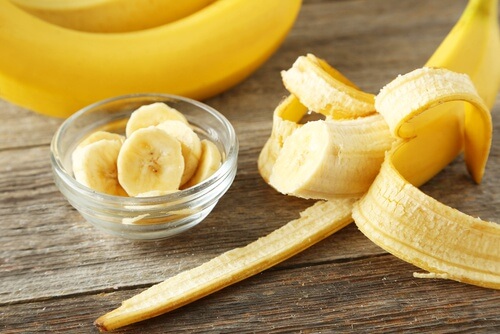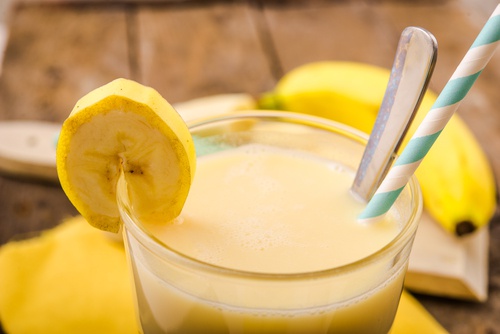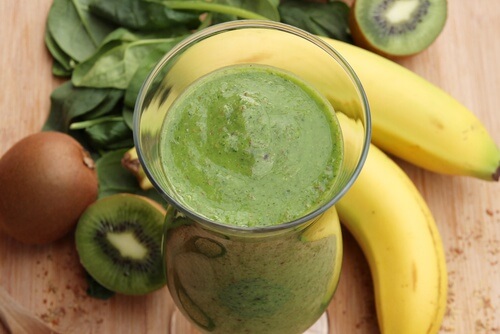Banana Smoothies for Incredible Weight Loss


Reviewed and approved by Doctor Carlos Fabián Avila
For decades, people have avoided bananas as a part of their weight loss diet. However, many studies are showing that contrary to popular belief, bananas and specially banana smoothies are good for the body and can help anyone trying to lose weight.
Bananas are delicious and because of their potassium content, they’re also good for fighting fluid retention and inflammation. By combining them with fat-burning foods like flax seed and spinach, you can create incredible banana smoothies that will give you energy and help you lose weight in a healthy way.
Why eat bananas?
Bananas contain up to 450 mg of potassium, a necessary mineral to help the body get rid of excess fluid. They also contain natural sugars like fructose, sucrose, and glucose that provide the body with natural energy while helping you to feel fuller and avoid overeating.
Bananas contain an amino acid called tryptophan, which the body uses to build proteins. It also stimulates the release of serotonin, an important neurotransmitter in the nervous system and a precursor to melatonin, an important hormone in the sleep cycle.
Despite the common misconception that bananas are fattening, it’s worth noting that a 3.5 oz serving contains just 100 calories. Although not necessarily low in calories, their most important benefit is that they’re filling which can help you avoid snacking between meals.
Bananas are a good source of vitamins A, B, and C and minerals like iron, copper, magnesium, calcium, zinc and potassium. They contain pectin and fiber which improve intestinal transit, promote digestion and can help prevent gastritis and treat intestinal ulcers.
Banana smoothies for weight loss

By combing bananas with foods like wild berries, flax seed and spinach, you can create fat-burning smoothies that will help you achieve better results in your weight loss diet. Obviously, these banana smoothies are intended to complement your diet and should be accompanied with good nutrition and exercise for the best results.
Banana Smoothie with Flax Seed
This delicious banana smoothie with flax seed will help you feel more satisfied, fight fluid retention and improve digestion.
Ingredients
- The juice of one orange
- 1 banana
- 2 tablespoons buttermilk
- 2 tablespoon flax seed
Directions
Add everything to a blender and blend until completely mixed. For best results, drink this as a meal replacement for breakfast.
Banana-Spinach Smoothie

Ingredients
- 1 banana
- 1 cup spinach
- ½ cup low-cal yogurt
- ⅓ cup crushed cereal
- 1 tablespoon honey
Directions
Combine everything in the blender and blend until smooth. Just like the recipe above, it should be used as a replacement for breakfast.
Banana-berry Smoothie
This delicious smoothie nourishes your body with important antioxidants and other essential nutrients to improve your health and help you lose weight. Its ingredients will decrease your appetite and stop you from eating extra calories during the day. In addition, it’s great for fighting fluid retention and avoiding constipation.
Read also:
Ingredients
- 1 tablespoon honey
- 1 banana
- ½ cup warm water
- 1 tablespoon grated ginger
- 1 cup blueberries, blackberries or raspberries
Directions
Add everything to the blender and blend until smooth. Drink this refreshing smoothie at breakfast or as a substitute for breakfast. If you like, drink it 45 minutes before eating your meal.
All cited sources were thoroughly reviewed by our team to ensure their quality, reliability, currency, and validity. The bibliography of this article was considered reliable and of academic or scientific accuracy.
-
Escudero, E., & González, P. (2006). La fibra dietética. Nutrición Hospitalaria. https://doi.org/10.1017/CBO9781107415324.004.
-
Nutrición. (2017). Archivos de Bronconeumologia. https://doi.org/10.1016/S0300-2896(17)30365-4.
-
Carbajal, A. (2013). Manual de Nutrición y Dietética. Departamento de Nutrición. Facultad de Farmacia. Universidad Complutense de Madrid. https://doi.org/10.1007/s13398-014-0173-7.2.
This text is provided for informational purposes only and does not replace consultation with a professional. If in doubt, consult your specialist.








